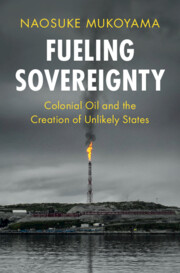
-
Select format
-
- Publisher:
- Cambridge University Press
- Publication date:
- 14 March 2024
- 21 March 2024
- ISBN:
- 9781009444286
- 9781009444309
- 9781009444293
- Dimensions:
- (229 x 152 mm)
- Weight & Pages:
- 0.5kg, 248 Pages
- Dimensions:
- (229 x 152 mm)
- Weight & Pages:
- 0.37kg, 248 Pages
Book description
European colonialism was often driven by the pursuit of natural resources, and the resulting colonization and decolonization processes have had a profound impact on the formation of the majority of sovereign states that exist today. But how exactly have natural resources influenced the creation of formerly colonized states? And would the world map of sovereign states look significantly different if not for these resources? These questions are at the heart of Fueling Sovereignty, which focuses primarily on oil as the most significant natural resource of the modern era. Naosuke Mukoyama provides a compelling analysis of how colonial oil politics contributed to the creation of some of the world's most “unlikely” states. Drawing on extensive archival sources on Brunei, Qatar and Bahrain, he sheds light on how some small colonial entities achieved independence despite their inclusion in a merger project promoted by the metropole and regional powers.
Awards
Short-listed, 2025 Hedley Bull Prize, European Consortium for Political Research
Winner, 2025 Institute of Developing Economies Award, Institute of Developing Economies Japan External Trade Organization
Short-listed, 2025 Hedley Bull Prize, European Consortium for Political Research
Reviews
‘A fascinating story of origins, first unearthing and then resolving a puzzle that scholars of international politics have overlooked in the transition away from empire: how were many hundreds of colonies transformed into a much smaller number of post-colonial states? Who got sovereignty, who didn’t, and why? This beautifully written treatment ranges across regions in weaving together an explanation combining the ideas, geopolitics, and resource endowments.’
J. C. Sharman - University of Cambridge
‘Fueling Sovereignty is an outstanding scholarly achievement, offering intriguing new insights into the intersection between resource politics, sovereignty, and evolution of the modern international system. Naosuke Mukoyama compellingly explores how the timing and scope of oil discoveries crucially conditioned local leaders’ abilities to resist imperial pressures for amalgamation, often yielding powerful new petro-states in defiance of Western designs. This is a tremendous book, which will be of interest not only to historical International Relations scholars, but to everyone curious to better grasp how struggles for control over natural resources continue to profoundly influence world politics.’
Andrew Phillips - Associate Professor of International Relations and Strategy, School of Political Science and International Studies, University of Queensland
‘Naosuke Mukoyama’s innovative study blends theories of state formation and natural resource politics to craft a fascinating account of how colonial oil production facilitated the creation of the world’s most unlikely sovereign states. Through close readings of deviant cases, Fueling Sovereignty illuminates broader relationships between resources and political development, while reminding us of the historical contingency and complexity of decolonization.’
Emily Meierding - Naval Postgraduate School and author of The Oil Wars Myth
‘When the wave of decolonization occurred in the last century, borders could have been and were drawn in many different ways, and prior colonial boundaries did not always translate into lines on a map demarcating sovereign states. Against this historical background, how is it that certain seemingly improbable, small states emerged out of these processes? In this pathbreaking study, Naosuke Mukoyama convincingly elucidates the factors and logics that allowed a number of otherwise ‘unlikely states’ to come into being.’
T. H. Hall - Professor of International Relations, University of Oxford
‘This book will be of interest to a broad audience of scholars in International Relations, politics and history.’
Johanne Marie Skov Source: International Affairs
Contents
Metrics
Altmetric attention score
Full text views
Full text views help Loading metrics...
Loading metrics...
* Views captured on Cambridge Core between #date#. This data will be updated every 24 hours.
Usage data cannot currently be displayed.
Accessibility standard: Unknown
Why this information is here
This section outlines the accessibility features of this content - including support for screen readers, full keyboard navigation and high-contrast display options. This may not be relevant for you.
Accessibility Information
Accessibility compliance for the PDF of this book is currently unknown and may be updated in the future.


